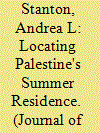|
|
|
Sort Order |
|
|
|
Items / Page
|
|
|
|
|
|
|
| Srl | Item |
| 1 |
ID:
159370


|
|
|
|
|
| Summary/Abstract |
This article considers the use of emoticons on transnational, English-language Islamic website forums as a case study to examine the shifts in Sunni religious authority, which have accelerated and deepened in the era of computation and new media. It shows the ways in which ordinary Muslims on conservative web forums invoke, deploy, and respond to different kinds of authority, from jurists to site administrators. It focuses first on particular websites’ endorsement of certain emoticons as Islamic (a smiley face with a hijab, e.g.), and then turns to forum users’ debates about emoticon usage. These debates range from questioning the acceptability of figural emoticons to the appropriateness of ‘secular’ emoticons on self-identified Islamic websites. It finds that while users often cite or request fatawa on emoticon usage when disputing with others, they are equally likely to post what they consider relevant hadith, appeal to common sense, or appeal to site administrators. This ground-up approach to engaging with the issue of emoticons gives nuance to what some scholars have termed the “crisis of authority” in Sunni Islam, and suggests that ordinary Muslims find authority in a diverse, sometimes contentious spectrum of locations. Far from being irrelevant to scholarship on contemporary Islam, emoticons are an important locus for understanding how pious Muslims have negotiated interactions in online spaces.
|
|
|
|
|
|
|
|
|
|
|
|
|
|
|
|
| 2 |
ID:
183496


|
|
|
|
|
| Summary/Abstract |
This article uses the case study of the Bahrain listeners’ committee, a radio listening group formed in 1938 in response to the establishment of the BBC’s Arabic broadcasting service, to argue that interwar Gulf radio listening was more extensive than has been imagined, that Gulf listeners had specific interests regarding radio programming that differed from those in the Levant, and that small groups of listeners could substantially impact the Arabic service’s programming. The BBC’s Arabic service was launched as a counterweight to Italy’s Radio Bari, which broadcast anti-British sentiment in Arabic, and its primary imagined listeners were Levantine. However, Gulf listeners also tuned in—and the Bahrain listeners’ committee were faithful listeners. They met regularly for 5 years, offering unsparing advice regarding reception and programming, and consistently requesting more news. Their desire for more news resulted ultimately in a second Arabic news broadcast and a new, Bahrain-based broadcast, in which the committee played a critical role. But wartime communications made it difficult for the BBC to obtain their notes, and after 1943, they disappear from the archival record. The committee’s story highlights the importance of Gulf radio listening and more complicated and interconnected notions of broadcaster and listener agency.
|
|
|
|
|
|
|
|
|
|
|
|
|
|
|
|
| 3 |
ID:
161102


|
|
|
|
|
| Summary/Abstract |
The carving up of the Ottoman Levant into British and French Mandates after World War I introduced new realities for the inhabitants of the region. This article uses Lebanese tourism and the promotion of Lebanon as a tourist destination to Palestinians of all religious backgrounds as a case study to investigate the challenges and potentials of the new Mandate structures. Using Palestinian government archives and newspapers, it examines how Lebanon was marketed to Palestinian vacationers. It concludes by suggesting that tourism, with its mixture of private and government sector interests, serves as a key node for observing the messy process of relational identities when two sets of neighbors worked to reframe themselves in national terms.
|
|
|
|
|
|
|
|
|
|
|
|
|
|
|
|
|
|
|
|
|